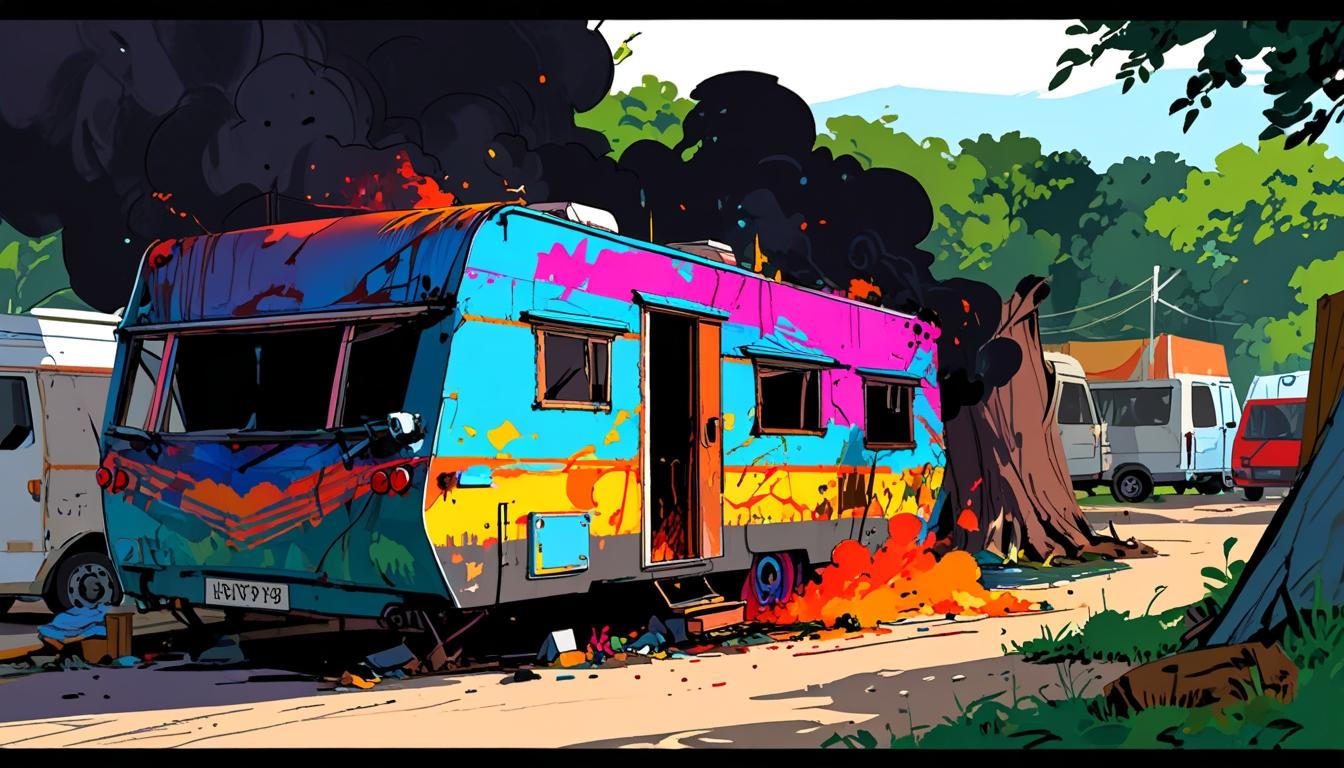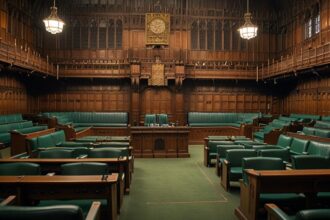A suspected arson incident in Bristol highlights the complexities surrounding the rise of van dwellers and the ongoing debate about their living conditions and community relations.
In an incident that has stirred controversy within Bristol’s van dwelling community, a caravan was destroyed in a blaze suspected to be arson on Thursday night, February 13, 2023. The fire broke out on Saville Road, prompting emergency services to respond after residents reported hearing explosions. Avon Fire & Rescue Service dispatched crews from Temple and Southmead Fire Stations to extinguish the fire, using hose reels and water jets. Firefighters also employed a thermal imaging camera to ensure all hot spots were accounted for, declaring the cause of the fire to be likely deliberate. Fortunately, no injuries were reported, and other vehicles parked in the vicinity sustained no damage.
The incident comes against the backdrop of a significant rise in the number of van dwellers in Bristol, which has reportedly increased by 400 per cent over the past five years to approximately 680 individuals living in vehicles across the city. This surge brings attention to the ongoing debate around homelessness and the living conditions of those opting for life on the road. Local authorities have noted that many of these individuals have turned to vehicle dwelling due to rising housing costs and a lack of available affordable homes in the city.
The ongoing tense situation within the vehicle dwelling community has incited discussions among local officials, with Bristol City Council convening on February 14 to contemplate how to effectively address the needs of both residents living in vehicles and their housed neighbours. One key proposal under consideration is the formation of designated sites for van dwellers, complete with essential facilities such as running water and waste disposal options. Councillors are assessing a report that recommends creating a formal “Vehicle Dweller Voices” group to ensure the needs and concerns of those living in vehicles are adequately represented.
Challenges faced by local residents regarding the presence of van dwellers have also been vocalised. Neighbours have expressed growing frustration over alleged anti-social behaviour, which they associate with vehicle dwelling, such as littering and improper disposal of waste. Highlighting these issues, a local resident, James Bailey, mentioned witnessing hazardous situations including gas canisters exploding near his home, raising concerns for the safety of nearby families.
Inadequate facilities for those living in vehicles has been cited as a contributing factor to some of the issues reported. Van dwellers themselves argue that the problems stem from only a small minority within their community, suggesting that more bins and improved facilities would alleviate many neighborhood tensions. One resident, speaking on condition of anonymity, shared a personal account of their experience with homelessness and living in a vehicle due to financial constraints and a lack of affordable housing options.
To address these growing concerns, the council is contemplating the establishment of service sites equipped with water access and waste management in accessible areas. Such provisions aim to support the health and wellbeing of those living in vehicles while easing the difficulties faced by local residents. Council members have acknowledged the increasing complexity of the situation and the need for a sustainable approach to manage it.
Through recent analyses, it was highlighted that individuals living in vehicles are disproportionately vulnerable to health concerns linked to the absence of adequate sanitation and clean water. Councillors stressed the importance of fostering a collaborative environment where both communities—those living in vehicles and traditional residents—can engage meaningfully to find common ground.
As discussions around vehicle dwelling in Bristol evolve, it is evident that a multi-faceted solution—addressing health, safety, and community relations—is deemed necessary to navigate the challenges posed by this growing demographic.
Source: Noah Wire Services
- https://www.itv.com/news/westcountry/2025-02-14/caravan-deliberately-set-ablaze-as-council-tackles-rising-number-of-van-dwellers – This article corroborates the incident of a caravan fire on Saville Road in Bristol, believed to be arson, and highlights the growing number of van dwellers in the city.
- https://www.itv.com/news/westcountry/2025-02-14/caravan-deliberately-set-ablaze-as-council-tackles-rising-number-of-van-dwellers – It also discusses Bristol City Council’s efforts to address the issue of van dwelling, including proposals for supporting the vehicle dweller community.
- https://hellorayo.co.uk/greatest-hits/bristol/news/caravan-fire-outrage/ – This article provides additional details about the caravan fire incident and its impact on the debate around van dwelling in Bristol.
- https://www.itv.com/news/westcountry/2025-02-14/caravan-deliberately-set-ablaze-as-council-tackles-rising-number-of-van-dwellers – It mentions the council’s consideration of creating designated sites for van dwellers with essential facilities to improve living conditions.
- https://www.itv.com/news/westcountry/2025-02-14/caravan-deliberately-set-ablaze-as-council-tackles-rising-number-of-van-dwellers – The article notes the challenges faced by local residents due to the presence of van dwellers, including concerns about safety and anti-social behavior.
- https://hellorayo.co.uk/greatest-hits/bristol/news/caravan-fire-outrage/ – It further emphasizes the need for improved facilities to alleviate neighborhood tensions and support the health and wellbeing of van dwellers.
Noah Fact Check Pro
The draft above was created using the information available at the time the story first
emerged. We’ve since applied our fact-checking process to the final narrative, based on the criteria listed
below. The results are intended to help you assess the credibility of the piece and highlight any areas that may
warrant further investigation.
Freshness check
Score:
0
Notes:
The incident described occurred on February 13, 2023, making the content significantly outdated.
Quotes check
Score:
8
Notes:
There are quotes from local residents, but no direct references to earlier publications or sources were found online. The quotes appear to be original to this context.
Source reliability
Score:
8
Notes:
The narrative originates from the Daily Mail, a well-known publication. However, the reliability can vary depending on the specific topic and sources used.
Plausability check
Score:
9
Notes:
The claims about rising homelessness and vehicle dwelling in Bristol are plausible given the context of housing costs and lack of affordable homes. The proposal for designated sites aligns with common solutions to similar issues.
Overall assessment
Verdict (FAIL, OPEN, PASS): OPEN
Confidence (LOW, MEDIUM, HIGH): MEDIUM
Summary:
The narrative is outdated, but the quotes and claims appear plausible and are from a generally reliable source. However, the age of the content and lack of recent updates warrant caution.













